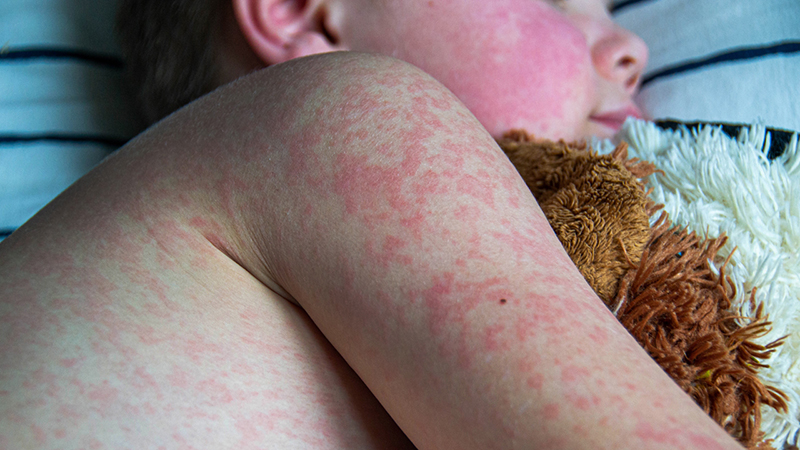Overview
What You Need to Know About Measles
What is measles?
Measles is a respiratory virus (an illness that affects the lungs). It spreads easily to other people through coughs and sneezes.
Common symptoms
Measles symptoms can start 7 to 14 days after you are exposed. They can include:
- Fever
- Feeling unwell
- Cough
- Nasal congestion
- Pink eye (conjunctivitis)
- Rash with tiny red spots that starts at your head and spreads to the rest of your body
Is measles contagious?
Yes, measles is highly contagious. People who have measles can easily spread the virus to people who are not immune to it.
When someone with measles coughs, sneezes or talks, infectious droplets spray into the air where other people can breathe them in and get the measles virus. The droplets can live in the air for up to 2 hours.
When the droplets land on a surface, they can live and spread for several hours. You can get the measles virus by putting your fingers in your mouth or nose, or by rubbing your eyes after you touch the infected surface.
Is there a vaccination for measles?
Yes. You can protect yourself from measles with the measles, mumps and rubella (MMR) vaccine.
- Most children get their first dost of the MMR vaccine between 12 and 15 months of age, and their second dose between 4 and 6 years of age.
- If you have not gotten the MMR vaccine, or do not know if you are immune to measles, call your physician. They can help you decide if you need the vaccine.
According to the Centers for Disease Control and Prevention (CDC):
- 2 doses of the MMR vaccine are 97% effective at preventing measles.
- 1 dose is about 93% effective at preventing measles.
What to do if you are exposed to measles
If you think you have been exposed to someone who has measles and you have not gotten the MMR vaccine:
- Call your clinician right away. They can help you treat any symptoms. They will also tell you if you need medical care.
- Stay home and away from others, if possible, for at least 28 days
- Wear a mask if you are around other people.
- Cover your coughs and sneezes.
- Every day, clean surfaces you touch often (faucets, doorknobs and kitchen counters)
How to confirm you have measles
Your physician can give you a test to see if you have measles.
Measles complications
Measles can cause serious health complications. People who are at risk of complications from measles include:
- Children younger than 5
- Adults older than 20
- Pregnant people
- People with weakened immune systems, such as people with cancer
Common complications include ear infections in children and diarrhea in adults.
More serious complications can include lung infection (pneumonia) or brain swelling.
What happens if you come to a Northwestern Medicine hospital
You must wear a mask if you have a rash or show signs of measles. This helps prevent measles from spreading and protects others.


